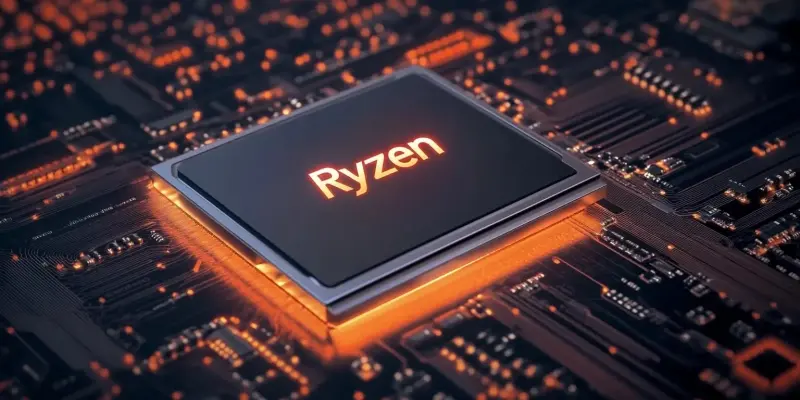The recently unveiled AMD Ryzen AI 7 350 APU, which has been benchmarked on Geekbench 6.3, represents a significant advancement in AMD’s APU offerings, particularly within the budget and mainstream laptop and mobile device sectors. This new APU, part of the Krackan Point family, boasts 8 cores and 16 threads with an impressive boost clock exceeding 5GHz, showcasing remarkable single-core performance. Designed to offer top-tier computing prowess without the hefty price tag associated with high-end processors, the Ryzen AI 7 350 APU delivers notable improvements over its predecessors.
Specifications and Benchmark Performance
The Ryzen AI 7 350 APU, when benchmarked on an Acer Swift SFG16-61 laptop, reached 2677 points in single-core and 11742 points in multi-core tests on Geekbench. These results underscore the APU’s substantial single-core performance enhancement, achieving a 14% uplift over the Zen 4-based Ryzen 7 8845HS. This performance leap is particularly impressive given the APU’s positioning within the budget and mainstream market segments. Despite these gains in single-core performance, the multi-core performance remains comparable to its predecessor, indicating an area where future improvements may be anticipated.
Additionally, the Ryzen AI 7 350 APU features a configuration of 4x Zen 5 and 4x Zen 5c cores, incorporating RDNA 3.5-based graphics. This integration not only enhances the overall performance but also ensures efficient energy use, with a Thermal Design Power (TDP) range between 15 to 45 watts. This makes the APU an ideal choice for devices where energy efficiency and performance must be balanced. Complementing the CPU capabilities, the APU supports advanced memory standards including LPDDR5X-8000 and DDR5, and offers 16 MB of shared L3 cache alongside 8 RDNA 3.5 Compute Units.
Technological Innovations and Market Position
This Ryzen AI 7 350 APU introduces the XDNA 2 engine, which provides up to 50 AI TOPS (Tera Operations Per Second), further enhancing AMD’s AI processing capabilities. This innovation is part of AMD’s broader strategy to integrate more sophisticated AI processing within its mainstream and budget products, ensuring users get advanced features without premium costs. The integration of such technology highlights AMD’s commitment to remaining competitive in an increasingly AI-driven market landscape, catering to consumers who require high-performing, AI-capable devices.
The Ryzen AI 7 350’s introduction at CES 2025 marks a critical point in AMD’s launch plan, which includes the unveiling of the Strix Halo series and the Radeon RX 8000 series. These product launches align with AMD’s broader strategy to diversify and strengthen its product portfolio, providing customers with a range of options that vary not only in performance but also in price. Moreover, rumors suggest the potential introduction of a 6-core Krackan Point APU with a 3x Zen 5 + 3x Zen 5c configuration, further hinting at AMD’s plans to expand its offerings within the Krackan Point family.
Looking Ahead
The newly introduced AMD Ryzen AI 7 350 APU, as demonstrated by its benchmark results on Geekbench 6.3, marks a significant breakthrough in AMD’s line of APUs, especially targeting the budget-friendly and mainstream categories of laptops and mobile devices. This innovative APU belongs to the Krackan Point family and is equipped with 8 cores and 16 threads. It features an impressive boost clock speed exceeding 5GHz, which highlights its outstanding single-core performance capabilities.
Aimed at delivering high-end computing power without the expensive price tag typically associated with top-of-the-line processors, the Ryzen AI 7 350 APU stands out with substantial improvements over its predecessors. It appeals to users seeking a balance between performance and cost-efficiency, making it an attractive option for a wide range of laptop and mobile device applications. This new APU is engineered to provide excellent computing power and efficiency, further solidifying AMD’s position in the competitive APU market.

